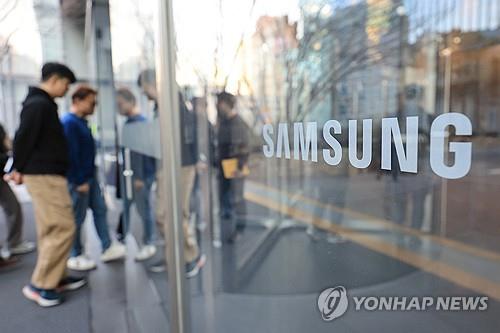- California Assembly OKs highest minimum wage in nation
- S. Korea unveils first graphic cigarette warnings
- US joins with South Korea, Japan in bid to deter North Korea
- LPGA golfer Chun In-gee finally back in action
- S. Korea won’t be top seed in final World Cup qualification round
- US men’s soccer misses 2nd straight Olympics
- US back on track in qualifying with 4-0 win over Guatemala
- High-intensity workout injuries spawn cottage industry
- CDC expands range of Zika mosquitoes into parts of Northeast
- Who knew? ‘The Walking Dead’ is helping families connect
Samsung Q4 profit drops 34.4 pct, but memory chip rebounds
Samsung Electronics Co. said Wednesday its fourth-quarter operating profit sank 34.4 percent from a year earlier due largely to sluggish semiconductor business but its memory chip segment turned to the black on recovering demand.
The world’s largest mobile phone and memory chip maker’s operating profit amounted to 2.82 trillion won (US$2.12 billion) for the October-December period, compared to 4.3 trillion won a year earlier, according to the company in a regulatory filing.
Its net profit tumbled 73.4 percent on-year to 6.34 trillion won and sales decreased 3.8 percent to 67.77 trillion won.

Samsung Electronics said it has invested 7.55 trillion won into research and development for the quarter ending December, marking the largest quarterly investment.
For all of 2023, Samsung Electronics posted 258.93 trillion won in sales, down 14.3 percent from a year earlier.
Its annual operating profit dived 84.9 percent on-year to 6.56 trillion won and net profit tumbled 72.2 percent to 15.48 trillion won.
It is the first time that Samsung Electronics logged an annual operating profit of less than 10 trillion won since 2008, when the company recorded 6.03 trillion won in the midst of the global financial crisis.
Samsung Electronics said its chip business earned 21.7 trillion won in sales for the three-month period through December, with an operating loss of 2.18 trillion won.
But the company said the DRAM business turned to a profit in the fourth quarter for the first time since the first quarter’s loss.
It has experienced a rebound in demand for memory chips used in personal computers, mobile gadgets and generative AI servers, with decreasing inventories.
Increasing sales of premium products, including high bandwidth memory (HBM) chips and double data rate 5 (DDR5) products, lent support to the improved bottom line for the fourth quarter.
Its foundry, or contract chip manufacturing, businesses achieved a record number of orders in the quarter, but its earnings remained sluggish over the three-month period due to a global slowdown. The company did not provide exact figures.
Samsung Electronics’ mobile and other device business posted 39.5 trillion won in sales and 2.6 trillion won in operating profit.
The smartphone segment saw its revenue and profit decrease due to lower smartphone sales in the fourth quarter, but demand for new tablet models and wearable products was solid over the cited period.
Earnings from the TV and home appliances business retreated due to intensified competition and waning market demand.
In the first quarter, Samsung Electronics is forecast to shift to a net profit in its memory chip business thanks to recovering demand for DRAM products. But the NAND flash memory sector is expected to remain in the doldrums.
Samsung Electronics said it plans to expand sales of value-added products to improve its balance sheet amid a gradual recovery in the IT market in the first quarter.
“We will focus on restoring profitability in the memory chip business by actively responding to demand for HBMs for generative AI and SSDs for servers in the first quarter,” the company said in a statement.
The company emphasized that the imminent recovery in memory demand will not affect its plans on production cuts.
“We expect DRAM inventories to reach a normal range as the first quarter progresses, and we expect NAND to normalize in the first half of the year at the latest, although the timing may vary depending on demand and market conditions,” Kim Jae-joon, executive vice president at Samsung Electronics, said in an earnings call. “We will continue to monitor market demand and inventory levels and flex our business strategy accordingly.”
He said sales of premium products, including HBM3 products, will account for more than half of its memory chip sales within the first half and will expand to 90 percent in the second half.
Samsung Electronics said it will also make concerted effort to boost sales of its latest Galaxy S24 smartphones, the first on-device AI model launched earlier this month, to maintain the lead in the AI smartphone market.











